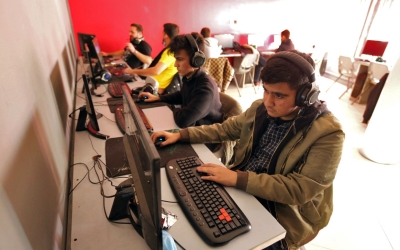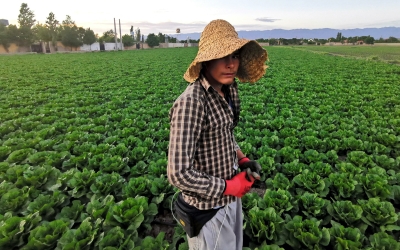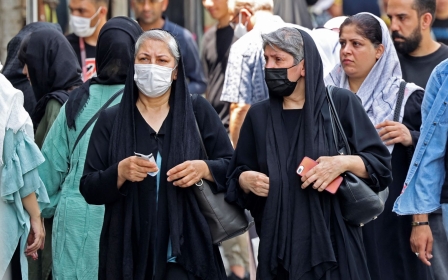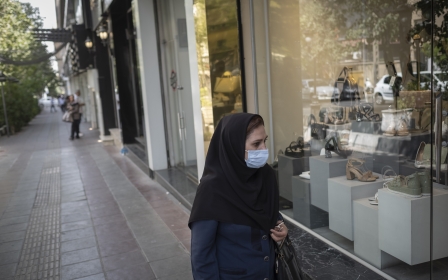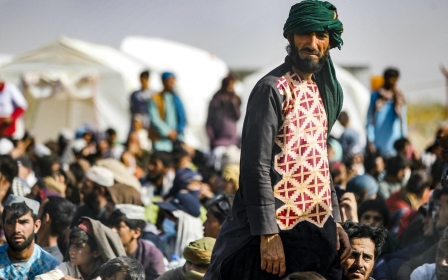Iranian press review: ‘Bad hijab’ fines hit pockets and cause uproar

Controversy over fines for 'bad hijab'
Farsi social media has been flooded with unverified reports since Sunday that the Islamic morality police would no longer arrest women with "inappropriate hijab", but would fine them instead.
However, a source in the national police headquarters denied "the existence of a list of fines" related to the Islamic veil, as claimed by the Etemaad daily, which published in a front-page article the details of fines for each category of what the authorities label as “bad hijab”.
"The fine for a slipped headscarf [around the neck] would be three million Iranian rials, short manteau 1.5 million, un-buttoned manteau one million, not putting on manteau five million, and 850,000 rials for having heavy makeup on," Etemaad reported on Saturday.
A day later, the daily deleted the report from its website and even removed all the PDF formats of its Saturday pages. However, the article had already been widely shared by other official outlets, such as Eghtesad News.
The Islamic morality police's attack on citizens to implement strict hijab law has been at the centre of social debate in Iran in the past three months. Following Etemaad’s report, some Iranian social media users denounced the hijab law.
"With the new scheme, giving fines for having a bad hijab on, or having no hijab on, or wandering around totally naked, the Islamic Republic [of Iran] has proven that in this country you can do whatever you want; you just need to pay its price," wrote one social media user.
Up to 1.5 million Afghans escaped to Iran
Since last year’s collapse of the US-backed government in Afghanistan, between 500,000 and 1.5 million Afghan refugees have settled in Iran, Unicef has reported.
Robin Nandy, Unicef’s representative in Iran, provided the number in an interview with Khabar Online, without elaborating on the reasons for not having a more precise figure.
Before the Taliban's victory, following a two-decade war with the US and its allies in Afghanistan, the number of Afghan refugees living in Iran ranged between two and three million, Nandy added. However, Iranian officials say that eight million Afghan refugees lived in Iran before August 2021.
Iran and Pakistan have accepted the largest number of refugees escaping Afghanistan over four decades of conflict.
Thousands of Afghan refugees en route to Europe cross Iran to reach Turkey. Many of these undocumented refugees, especially women and children, face inhumane treatment at the Iran-Afghanistan and Iran-Turkey borders, as well as during their journey inside Iran and Turkey.
Water shortages push farmers towards Iraq and Turkey
The number of Iranian farmers and large agricultural landowners applying for emigration has risen sharply as the water crisis worsens in Iran, the Shargh daily reported.
Australia and Canada are the final destinations for wealthy farmers and landowners, while the underprivileged are moving to neighbouring Iraq and Turkey.
The report said pistachio growers are in high demand in Turkey, as Ankara has developed new strategies to overtake Iran's pistachio market in recent years.
The farmers who migrate to Iraq are at the bottom of the pyramid.
"Those emigrating to Iraq even accept to work as farmworkers, seeing that their minimum wage would be six or seven times more than in Iran," Shargh reported.
"Iraq faces a water crisis, but their strategy to apply scientific agriculture has also attracted Iranian growers, ranchers and fish farmers," the daily quoted Mehdi Karmi, former director of the Iran-Iraq joint chamber of commerce.
Farmers in Khuzestan and Sistan and Baluchistan provinces have abandoned agricultural lands or advertised their farms for sale, due to the water shortage and nationwide drought, Shargh added.
Universities opt for online learning in economic crisis
Iran's minister of science, research and technology, Mohammad Ali Zolfigol, said public universities might have no choice but to adopt distance learning due to the ongoing economic crisis and public universities' lack of resources.
The state-run news agency, IRNA, quoted Zolfigol as saying: "We are forced to make parts of higher education online, which is not right and would lead to academic failure."
Zolfigol’s comment is rare for a high-ranking official in President Ebrahim Raisi's administration, as ministers and officials have been stressing that they are in control of the economic crisis caused by US sanctions.
According to Zolfigol, his ministry's top priorities are paying salaries and providing subsidised food and dormitories for students, which will use up most of the funding for public universities.
"Some universities do not have the necessary budget for scientific activities and maintenance, so the universities' laboratories get outdated," he added.
The worsening situation in Iran's higher education is causing serious concern in Tehran over a brain drain.
*Iranian press review is a digest of news reports not independently verified as accurate by Middle East Eye.
Middle East Eye propose une couverture et une analyse indépendantes et incomparables du Moyen-Orient, de l’Afrique du Nord et d’autres régions du monde. Pour en savoir plus sur la reprise de ce contenu et les frais qui s’appliquent, veuillez remplir ce formulaire [en anglais]. Pour en savoir plus sur MEE, cliquez ici [en anglais].


